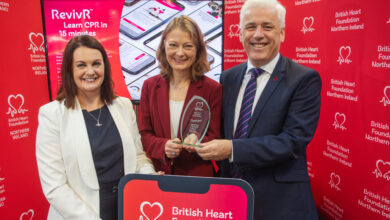Optimising medicines
agendaNi examines plans to make medicines more effective across the health and social care system. Better communication between professionals will help to improve outcomes for patients.
‘Medicines optimisation’ is a term used by health professionals to describe the maximising of beneficial outcomes and the minimising of harm from the use of medicines. Its starting point is good medicines management, which historically has been based on five ‘rights’:
1. the right patient;
2. the right medication;
3. the right dose;
4. the right time and frequency of administration; and
5. the right route.
The Department of Health, Social Services and Public Safety is currently consulting on a medicines optimisation quality framework, to improve the effectiveness of drugs dispensed by health professionals in Northern Ireland over the next five years.
Two additional ‘rights’ are added i.e. the right outcome for the patient and the right cost for the Health Service. The framework is being drawn up to meet the increasing demands of an ageing population, advances in medicines and technology, a growing evidence base, and the need for the consistent delivery of best practice and cost-effective medicines management.
The public sector spends £550 million per annum on medicines: 14 per cent of the health and social care budget. The cost of prescribing in Northern Ireland stands at £223.54 per capita compared to £160.12 in England – a difference explained by higher levels of deprivation although the statistics may also reflect differences in definitions and prescribing arrangements.
While the document does not explicitly mention the Troubles, the Commission for Victims and Survivors has separately highlighted the extra pressures on physical and mental health due to the Troubles. This adds an extra need for treatment which is not present to the same extent in Britain.
Northern Ireland’s high prescribing costs were first highlighted in the 2000 Comprehensive Spending Review which led to the first ‘whole system’ plan to control the medicines budget. The 2005 Appleby report encouraged the greater uptake of generic drugs and led to the setting up of a pharmaceutical clinical effectiveness programme.
The McKinsey review of health and social care, in 2010, welcomed the programme’s progress but added that further efficiencies were possible if prescribing growth and costs were brought in line with the rest of the UK. The prescribing budget was transferred from the department to the Health and Social Care Board, whose own clinical effectiveness programme has subsequently saved £132 million.
The department continues to lead the regional innovation programme.
One example of best practice is the ‘integrated medicines management service’ which has reorganised clinical pharmacy in the health and social care trusts. Benefits have included reduced lengths of stay, lower readmission rates, a lower level of error and more appropriate use of medication. Each £1 invested in the service has equated to £5-8 in efficiencies. Prescribers within the health and social care system can refer to a standard Northern Ireland medicines formulary and around two-thirds of their dispensing now involves generic medicines.
The framework sets out what a patient can expect as routine practice in each of the four main settings where they may receive medicines as part of their care and treatment.
Within 24 hours of a hospital admission, they should have a ‘medicines reconciliation check’ by a pharmacist or pharmacy technician i.e. collecting information about their current medicines, checking for omissions, duplications and other discrepancies, and recording and communicating any changes. This will occur again when a patient moves between wards or between hospitals, and family members and carers may also be involved in the checking process.
Communication is one of the strongest themes throughout the strategy i.e. GPs, community pharmacists and clinical pharmacists, and other health professionals should have an attitude of sharing information where this is in the patient’s best interests and will improve the outcome of the medication.
To roll out the framework, the department will this year bring together a ‘strategic alliance’ of health and social care professionals, service commissioners and policy-makers. This will agree a prioritised work plan for 2015-2020. The framework will initially be funded through the existing strategic innovation in medicines management programme. Future funding needs will be identified in a strategic financial plan which will consider how to use UK and EU funding streams and resources. A ‘dashboard’ of data will also bring together information on medicines use across the region and allow trusts, local commissioning groups and GPs to monitor their performance.
The consultation on the plan closes on 14 August and views and comments can be sent to medicinesoptimisation@dhsspsni.gov.uk
Hospital practice
• Medicines reconciliation check within 24 hours of admission
• Repeat check when moving to new ward or hospital
• Involve and inform patients in decisions on medicines
• Monitor patient responses to medication
• Administer appropriate medicines on time
• Medicines reconciliation check before discharge
• Supply prescribed medicines and relevant information
Community pharmacy
• Check prescription before it is dispensed
• Safe dispensing of high quality medicines
• Give appropriate information and advice
• Review after significant change in medication
• Ask patients if all repeat medicines are needed
• Work with other staff to ensure appropriate use
• Option of providing clinical medication reviews and monitoring health outcomes
Social care
• Check medicines with GP and pharmacy at each transition
• Stock adequate supplies of medicines
• Monitor ordering systems to avoid waste
• Identify individuals with specific needs or risks
• Monitor individuals taking own medication
• Administer appropriate medicines on time
• Annual clinical review for repeat medication
General practice
• Medicines reconciliation check on first registration
• Involve patients in decisions about their medicines
• Identify and help patients on multiple or high risk doses
• Annual face-to-face clinical review for repeat medication
• Monitor patient responses to medication
• Encourage questions and openness from patients
• Review medicines after discharge from hospital






